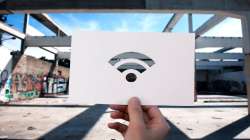7 expert tips to stay secured under public Wi-Fi networks
When you're on the go and in need of a quick internet connection, public Wi-Fi can be very useful. Yet, using it comes with a number of hazards.

Public Wi-Fi networks have become a common sight in cafes, airports, hotels, and other public spaces. They provide a convenient way to stay connected to the internet while on the go. However, connecting to a public Wi-Fi network can be risky as it exposes your device and personal information to potential cyber threats. Hackers can easily intercept your online activities and steal your sensitive information, including passwords, credit card details, and more. To stay safe and protect your privacy when using public Wi-Fi, there are several things you should keep in mind.
ALSO READ: Instagram's new collaborative collection feature for friends: Know everything
Here are seven important considerations to help you stay secure on public Wi-Fi networks.
Verify the Network
Before connecting to any public Wi-Fi network, always verify the network name with the staff or the management of the location. Hackers can create fake Wi-Fi networks with names similar to legitimate networks to trick users into connecting to them. This is known as a "man-in-the-middle" attack, and it allows hackers to intercept your online activities and steal your personal information.
Use a VPN
A Virtual Private Network (VPN) is an essential tool that encrypts your internet traffic and creates a secure tunnel between your device and the internet. By using a VPN, you can protect your online activities and personal information from potential hackers. When choosing a VPN, ensure that it is reputable and has a proven track record of keeping users' data secure.
ALSO READ: OnePlus and Oppo are not leaving the European market
Avoid Accessing Sensitive Information
Avoid accessing sensitive information like banking details, credit card information, or personal data while connected to public Wi-Fi. Hackers can easily intercept this information, putting your personal and financial security at risk. If you must access sensitive information, use a trusted cellular network or wait until you can connect to a secure Wi-Fi network.
Turn off Automatic Connections
Most smartphones and devices are programmed to automatically connect to available Wi-Fi networks. However, this can be risky as it could connect to a fake network or one that has been compromised. Turn off automatic connections and manually select the network you want to join to avoid connecting to a malicious network.
ALSO READ: Did Google copy ChatGPT to train 'Bard' chatbot?
Update Your Devices
Updating your devices regularly is crucial as it ensures that your device is equipped with the latest security features and bug fixes. This reduces the likelihood of your device being compromised by potential cyber threats.
Use Two-Factor Authentication
Two-factor authentication (2FA) is an extra layer of security that requires you to provide two forms of identification to access your accounts. This significantly reduces the likelihood of your accounts being hacked, even if your password is compromised. Ensure that you have set up 2FA for all your online accounts, especially those that contain sensitive information.
Use HTTPS Sites
Always use HTTPS sites when browsing the internet on public Wi-Fi networks. HTTPS encrypts your online traffic and makes it difficult for hackers to intercept your online activities. Additionally, avoid visiting untrusted sites or clicking on suspicious links, as these could lead to malware infections or phishing attacks.
ALSO READ: Apple MR Headset production delayed again: Know why?
By following these seven tips, you can stay safe and protect your privacy when using public Wi-Fi.